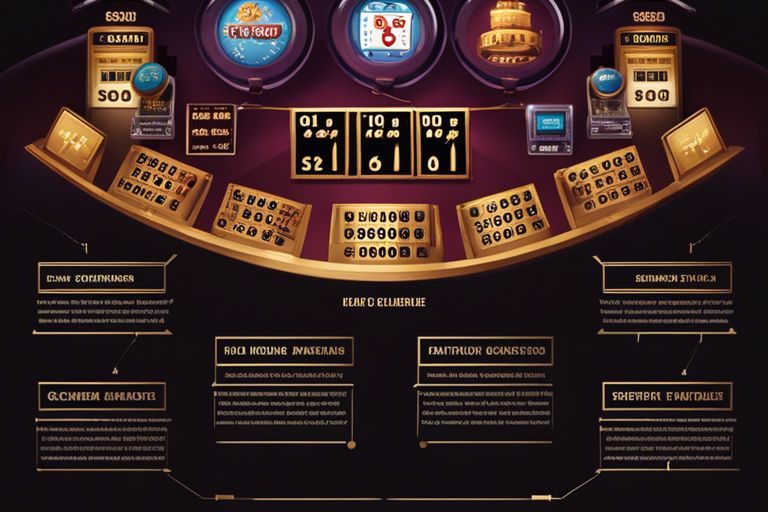Art and Science of Slot Game Mathematics

There’s no denying the fact that slot games are an integral part of the gambling industry. Behind the flashy lights, spinning reels, and exciting sound effects lies a complex and intricate world of mathematics. The art and science of slot game mathematics determine everything from the odds of winning to the overall profitability of a game. Understanding these mathematical principles is crucial for both players looking to increase their chances of winning and developers aiming to create engaging and lucrative games.
Basic Principles of Slot Game Design
Probability and Randomness
Your understanding of probability and randomness is crucial in slot game design. Any slot game is fundamentally built on the principles of probability, where the outcomes are determined by random number generators (RNG) to ensure fairness and unpredictability. These RNGs generate thousands of random numbers every second, determining the outcomes of each spin in a slot game.
Understanding Slot Reels and Paylines
Probability plays a significant role in determining the layout of slot reels and paylines. Any winning combination of symbols on a payline is based on the probability of those symbols appearing on the reels. Game developers use this knowledge to design captivating gameplay experiences that keep players engaged. By understanding the probabilities of different symbol combinations, developers can create exciting and rewarding experiences for players.
The arrangement of slot reels and paylines can significantly impact the overall gameplay. The number of reels, the number of symbols on each reel, and the number of paylines all contribute to the overall volatility and potential payouts of a slot game. Understanding how these elements work together is necessary in creating a slot game that is both entertaining and rewarding for players.
The Role of Mathematics in Slot Game Development
Little is known about the intricate mathematics that power the slot games we love to play. Behind the flashy graphics and engaging gameplay lies a complex web of algorithms and calculations that determine every outcome. Mathematics is the backbone of slot game development, guiding everything from the random number generator to the payback percentage.
The Random Number Generator Explained
One of the key components of slot game mathematics is the Random Number Generator (RNG). This sophisticated algorithm ensures that every spin of the reels is completely random and independent of the previous or future spins. The RNG generates thousands of numbers per second, each corresponding to a specific outcome on the reels. This level of randomness is crucial for ensuring fair gameplay and keeping players engaged.
Payback Percentage and House Edge
Edge one step further in understanding the mathematics behind slot games, we have the concepts of payback percentage and house edge. The payback percentage refers to the amount of money that a slot machine is programmed to return to players over time. This percentage is typically set by the game developer and can vary from one slot to another. On the other hand, the house edge is the mathematical advantage that the casino has over the players. It represents the percentage of each bet that the casino expects to win in the long run.
Another critical factor in slot game mathematics is striking a balance between payback percentage and house edge. Game developers must carefully tweak these parameters to ensure that players have a fair chance of winning while still allowing the casino to make a profit. Understanding these mathematical concepts is crucial for both players and developers to navigate the world of slot games successfully.
Slot Game Variance and Volatility
Defining Slot Game Variance
All slot games have a level of risk associated with them, known as variance. This is a measure of how frequently and how much a game is expected to pay out. Low variance slots offer smaller, more frequent wins, providing players with a steady stream of payouts. On the other hand, high variance slots may offer rare but significant payouts.
Risk and Reward: How Volatility Affects Gameplay
Any slot player should understand that volatility directly impacts their gameplay experience. Volatility, often used interchangeably with variance, determines the level of risk involved in playing a slot game. A low volatility slot will give out winnings more frequently, but these are likely to be smaller. In contrast, high volatility slots offer the potential for larger payouts, but they are less frequent.
Slot games with high volatility require a larger bankroll, as players may experience longer losing streaks before hitting a significant win. However, for those willing to take the risk, the rewards can be substantial. It’s vital for players to choose games that align with their risk tolerance and gaming preferences.
The Mathematics of Slot Game Bonus Features
For slot game enthusiasts, bonus features are often the most exciting part of gameplay. These special rounds can offer players the chance to win big with extra prizes and rewards. However, behind the thrilling animations and immersive storylines lie the intricate mathematics that power these features. Understanding the mathematical principles behind slot game bonus features can provide players with a deeper appreciation and insight into how these games work.
Types of Bonuses in Slot Games
For players, bonus features come in various forms, each offering a unique gameplay experience. Some popular types of bonuses in slot games include free spins, pick-and-win games, multipliers, sticky wilds, and progressive bonuses. These bonuses are designed to keep players engaged and entertained while also offering the potential for significant wins.
- Free Spins: Bonus rounds that offer players a set number of spins without having to wager additional credits.
- Pick-and-Win games: Players choose from a selection of options to reveal prizes or multipliers.
- Multipliers: Bonus features that multiply the player’s winnings by a predetermined factor.
- Sticky Wilds: Wild symbols that remain in place for a certain number of spins, increasing the chances of winning combinations.
- Progressive Bonuses: Bonuses that increase in value or complexity as players advance through the game.
This diversity adds depth and excitement to gameplay, keeping players engaged and entertained. Understanding the mechanics of each bonus type can help players strategize their gameplay and maximize their winning potential. This knowledge can also enhance the overall gaming experience and increase appreciation for the game developers’ creativity and ingenuity.
Mathematical Modeling of Bonus Rounds
To optimize bonus features and ensure a fair gaming experience, slot game developers employ complex mathematical models to determine the mechanics of bonus rounds. These models factor in probabilities, payouts, and player engagement to create bonuses that are both exciting and rewarding. By carefully analyzing these mathematical models, developers can fine-tune bonus features to maintain the game’s entertainment value while also ensuring that wins are adequately dispersed.
Slot games are meticulously crafted to deliver a balanced and enjoyable gaming experience, and mathematical modeling plays a crucial role in achieving this goal. Developers must strike a delicate balance between offering enticing bonuses and maintaining the game’s return-to-player (RTP) percentage. By understanding the intricacies of mathematical modeling in bonus rounds, players can gain insights into how these features are structured and optimized for both player enjoyment and fair gameplay.
Progressive Jackpots and Prize Pools
After regular slot games, progressive jackpots are some of the most attractive features for players in the casino world. These jackpots can reach enormous sums that can change a player’s life in an instant. How do progressive jackpots work, and what are the odds of hitting them? Let’s explore the details.
How Progressive Jackpots Work
An integral part of progressive jackpots is the accumulation of funds from players across multiple machines or online platforms. Every time a player makes a bet on a linked progressive slot game, a portion of that bet is added to the jackpot prize pool. This continues to grow until a lucky player hits the winning combination and claims the prize. The excitement and anticipation build as the jackpot grows bigger and bigger, creating a thrilling experience for players chasing the dream of a massive win.
Calculating Odds for Progressive Prizes
Progressive jackpot odds can be a bit more complex to calculate compared to regular slot games due to the variable nature of the jackpot size. However, understanding the odds of hitting the jackpot is crucial for players looking to maximize their chances of winning. Progressive jackpot odds are typically much lower than regular slot game odds, as the potential payouts are significantly higher. Players should carefully consider the odds and weigh them against the potential prize amount before deciding to chase a progressive jackpot.
Player Psychology and Game Math Interaction
The Psychology behind Slot Machine Appeal
Psychology: Slot machines have a unique appeal that taps into various psychological phenomena to keep players engaged. The flashing lights, exciting sounds, and the anticipation of a win all contribute to the allure of slot games. Additionally, the randomness of the outcomes creates a sense of suspense and excitement, prompting players to continue playing in the hopes of hitting a big jackpot. The element of risk and reward, intertwined with the dopamine rush that comes with each spin, keeps players coming back for more.
How Game Mathematics Influence Player Behavior
Any: Every aspect of a slot game, from the hit frequency to the payback percentage, is carefully calculated using mathematical algorithms. The game math determines how often a player will win, the size of the wins, and the overall gameplay experience. A crucial factor in player behavior is the concept of volatility, which refers to the risk and reward profile of a game. Games with higher volatility offer the potential for big wins but also come with a higher risk of losing streaks. Conversely, low volatility games provide more frequent wins but at smaller amounts.
Game: Understanding how game mathematics influence player behavior is vital for designing slot games that are both entertaining and profitable. By striking the right balance between risk and reward, game developers can create an experience that keeps players engaged while also ensuring the financial sustainability of the game. The interaction between player psychology and game math is a delicate dance that shapes the player experience and ultimately determines the success of a slot game in the market.
Ensuring Fairness and Compliance
Not only is the mathematical model behind a slot game crucial, but ensuring its fairness and compliance with regulations is of utmost importance. This involves carefully following regulatory requirements and undergoing rigorous testing processes to guarantee that players have a fair chance of winning.
Regulatory Requirements and Testing
Requirements set by regulatory bodies dictate the standards that must be met by slot game developers and operators. These requirements often include rules on minimum and maximum payouts, as well as guidelines for verifying the integrity of the game’s random number generator. Testing is typically conducted by independent testing laboratories approved by regulatory authorities to ensure that the game meets all necessary criteria for fairness and compliance.
The Role of Third-party Auditing Firms
For slot game developers and operators, working with reputable third-party auditing firms is vital to maintain transparency and credibility. These auditing firms are responsible for conducting regular and thorough assessments of the game’s software and operations to ensure that they comply with regulatory requirements and industry standards. By having an independent entity verify the fairness and compliance of their games, developers and operators build trust with players and regulatory authorities alike.
Understanding the role of third-party auditing firms helps ensure that slot games are held to a high standard of fairness and compliance. By entrusting these firms with the responsibility of verifying the integrity of the games, players can feel confident that they are participating in a legitimate and trustworthy gaming experience.
The Future of Slot Game Mathematics
Now, as we look ahead to the future of slot game mathematics, we anticipate a myriad of exciting developments that will reshape the landscape of the industry. Advancements in technology, coupled with the sophisticated use of data analytics, are set to revolutionize the way slot games are designed, played, and optimized.
Technological Innovations and Their Impact
With the rapid evolution of technology, slot game developers now have access to a wide array of tools and resources to enhance the player experience. From immersive augmented reality features to seamless integration with mobile devices, these innovations are poised to take slot gaming to new heights. Additionally, the use of artificial intelligence and machine learning algorithms will enable developers to create more personalized and engaging games that cater to individual player preferences.
Predictive Analytics and Player Profiling
One key area that will drive the future of slot game mathematics is the use of predictive analytics and player profiling. By analyzing vast amounts of data on player behavior, preferences, and spending patterns, developers can gain valuable insights into what makes a successful slot game. This information can then be used to tailor game features, bonuses, and rewards to maximize player engagement and retention.
Analytics
Analytics will play a crucial role in helping developers stay ahead of the curve in a highly competitive market. By leveraging data-driven insights, developers can make informed decisions that enhance the player experience and drive profitability. The ability to accurately predict player behavior and tailor games accordingly will be a game-changer in the future of slot game mathematics.
Final Words
With these considerations in mind, it is evident that slot game mathematics is a meticulous fusion of art and science. The balance between engaging themes, enticing features, and mathematical algorithms is crucial in creating successful and entertaining slot games. Game developers must understand player psychology, probability theory, and statistical analysis to design games that capture the interest of players while ensuring a fair and enjoyable experience.
Ultimately, the art and science of slot game mathematics play a pivotal role in the success of modern slot games. By combining creativity with mathematical precision, developers can create games that captivate players and drive engagement. As the gaming industry continues to evolve, understanding the intricate balance between art and science will be imperative for creating the next generation of compelling and immersive slot games.
FAQs:
What role does probability play in slot game design?
Probability governs the outcomes of slot games, ensuring fairness through random number generators (RNGs).
How do slot developers balance volatility in games?
Developers balance volatility to offer varied experiences, from frequent small wins to rare significant payouts.
What are the key factors in calculating progressive jackpot odds?
Progressive jackpot odds consider the jackpot size and game mechanics, influencing the likelihood of winning.
Why is third-party auditing crucial for slot game fairness?
Third-party audits verify compliance with regulations, ensuring transparency and fairness for players.
What advancements can we expect in the future of slot game mathematics?
Future developments include AI integration, predictive analytics, and personalized gaming experiences.
Recommended Posts

Gamification – Beyond the Casino
July 5, 2024

iGaming Analytics and Player Behavior
July 5, 2024

Blue Guru Games Releases St. Louis 1904 Slot
July 5, 2024




